Home
Surname List
Name Index
Sources
Email Us
|
Trip to Ukraine and Alsace - 2007
One group of Merck descendants made a trip in May-June 2007 to visit
the birthplace of Joseph John Merck, his family and ancestors in South Russia
(now Ukraine). After visiting the Kutschurgan villages where they lived and the city of Odessa, they visited Alsace, France, where their Merck ancestors had resided
before emigrating to South Russia in the early 1800s.
Elsass
Elsass, now called by its Russian name Scherbanka, was a primary goal of
our trip to the Ukraine. Founded by German immigrants in 1808, a Merck was one of the founders of the village. This is where Joseph John Merck and his wife, Katherine Cecilia Eberle, raised their family until they left South Russia for the promise of a
better future in the Americas. One of the six Kutschurgan villages, Elsass was
a Catholic village. It is believed that Joseph was a teacher of the children in
Elsass and his wife taught catechism.
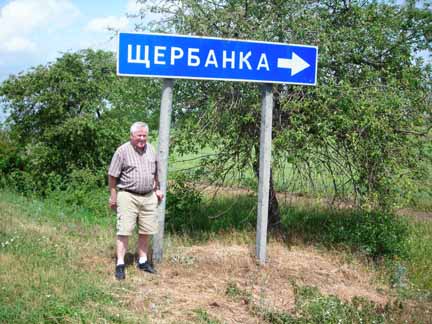
On the way to Elsass, we asked the bus
driver to stop at this road sign. It points to Scherbanka, the Russian
name currently used by the village. Each of us posed for a picture at the
sign. This one is Ed Merck. |
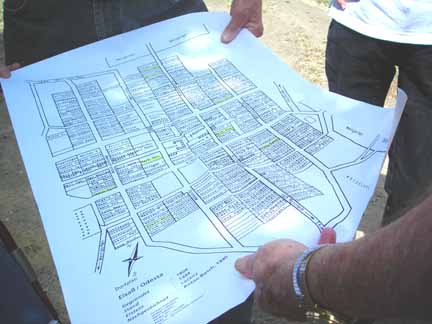
This map was obtained
from the North Dakota State University library. It portrays the 1944
location of each family in Elsass just before the residents evacuated
with the German army as Soviet troops advanced on the area. |

This building was
the church in Elsass until the Soviet communists converted it to public use. It is now used as a community center. The adjacent school building now
houses the post office. |
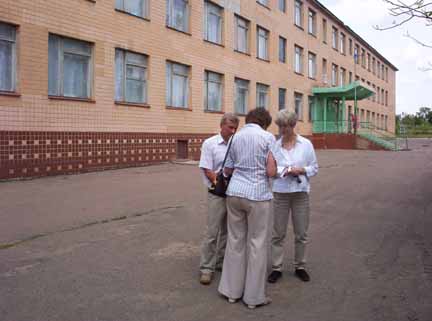
The relatively new
school building was built on property that had been, in part, the lot of one
of the Merck families in Elsass. We were privileged to have a tour of the
building conducted by the school's director. |
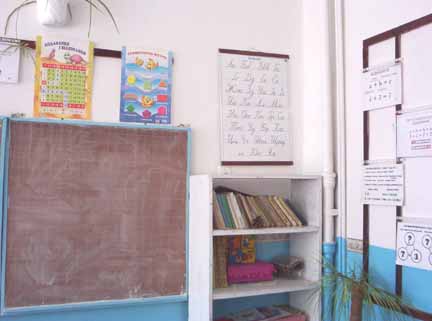
This is a view of
one of the classrooms in the Elsass school. |
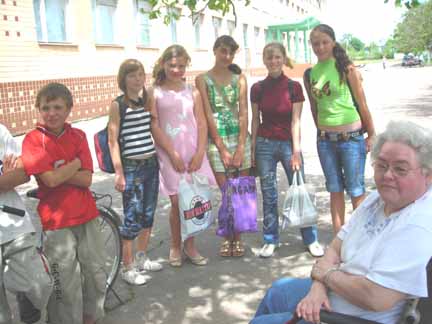
Ukrainian school children are just as curious about visitors to their village as are kids everywhere. |
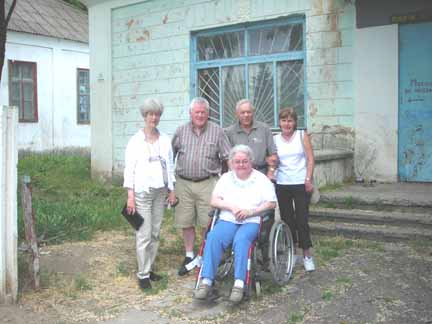
Lot 51 was just across the street
from the church building. This lot had been the site of a Merck family
home prior to 1944, thus all of us wanted to have a photo taken on that
ground assuming this could have been where our ancestors lived. |
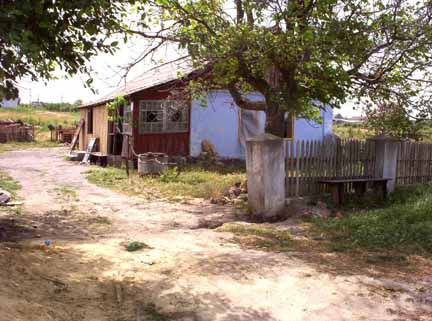
One of the former
Merck houses was still being used as a home. It was now occupied by a
Ukrainian family. It appears that this building is one of the original
village buildings which has survived for 200 years. |

The ladies of the village also were
interested in the large bus that pulled up in front of the former church and which unloaded an obviously curious group of people. |
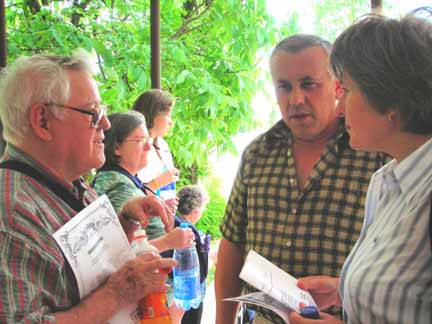
The Ukraine Soviet
Administrator of Scherbanka was anxious to meet our group. He presented
an invitation to return in September 2008 for the 200th anniversary of
the founding of the village. |
Mannheim
Mannheim is now called by its Russian name Kamenka. It was our first stop
on our visit to the villages of Kutschurgan. This was where the Eberle
family lived and was the birthplace of Katherine Cecilia Eberle, wife of
Joseph John Merck. It was at Mannheim where they were married in 1887.

This was our first view of the former Mannheim church when we arrived at the village. |

Marilyn Bruya, Jan and Mike Merck make a brief stop enroute to a closeup look of the church at Mannheim.
|
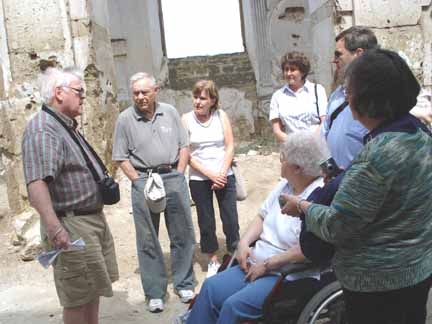
Ed Merck explains to the group that this is where their grandparents were married in 1887 before they
established their home in Elsass to raise a family.
|

Our guide points out to
Anna Whalen some of the markings the Russians made in the building when they converted it to civic purposes.
|
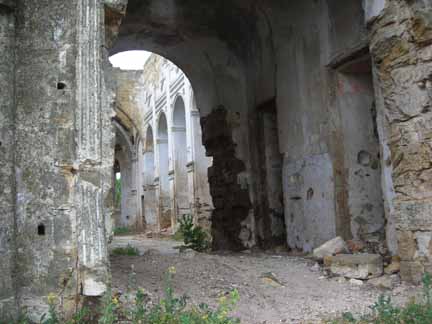
This is another view of the interior of the church building ruins.
|
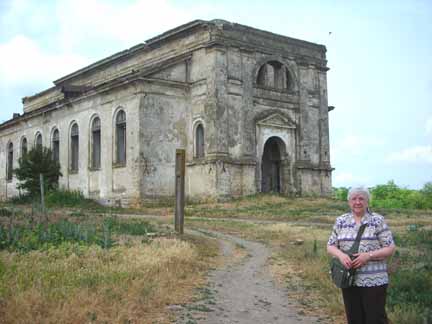
Lorraine Kraft is pictured
in front of the Mannheim church building. |

Ed Merck shows the map of Mannheim to
Sister Cathi Merck while Dan Whalen looks on.
|
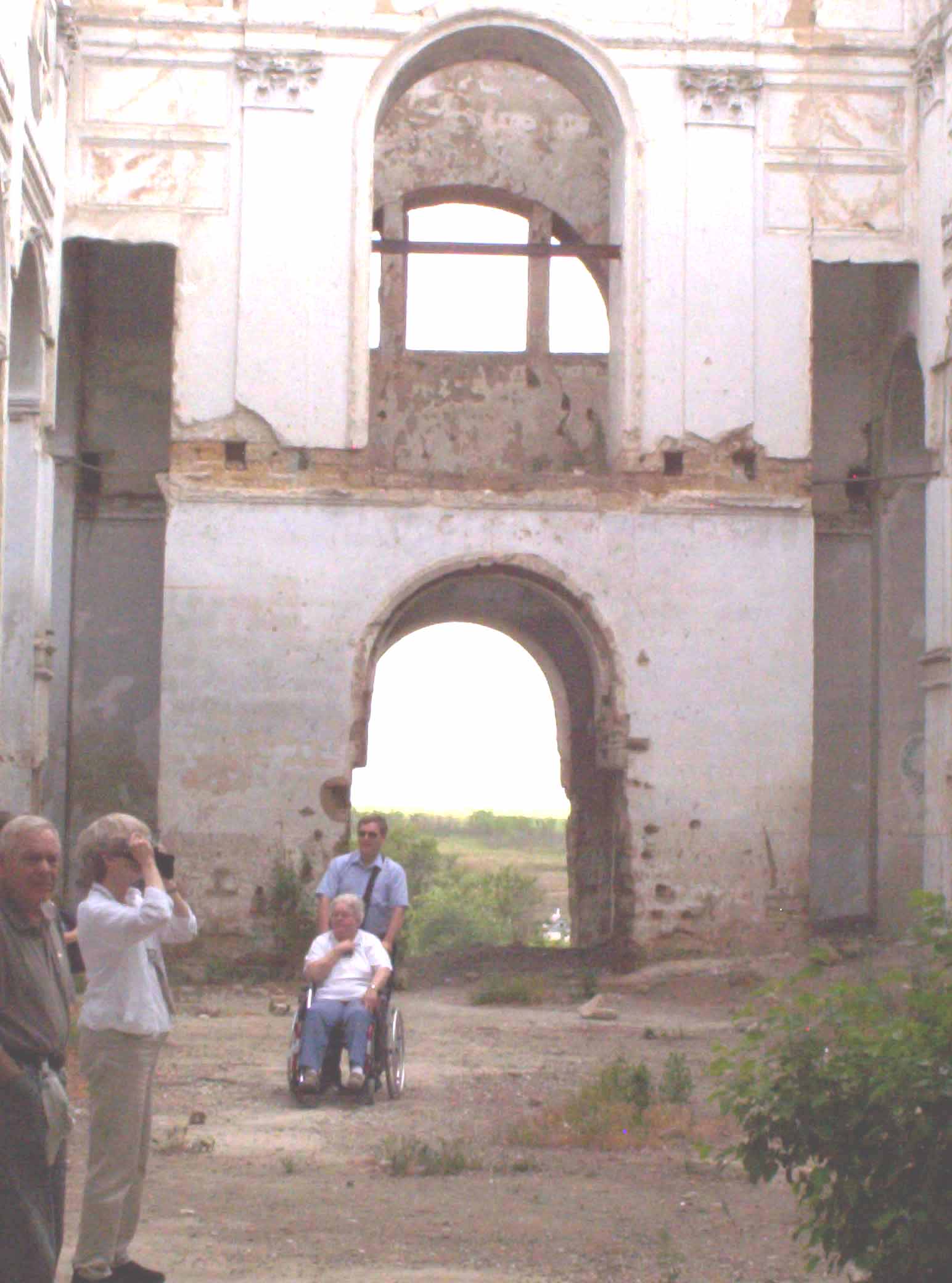
Mike Merck, Sister
Cathi Merck and Dan Whalen look on while Marilyn Bruya takes a picture.
|
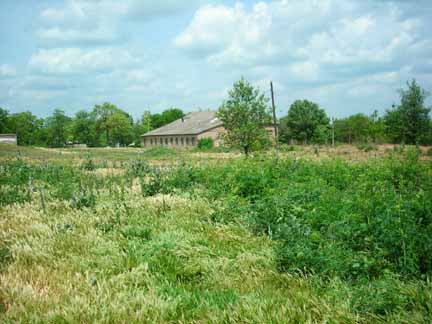
A view of the area surrounding
the church. |
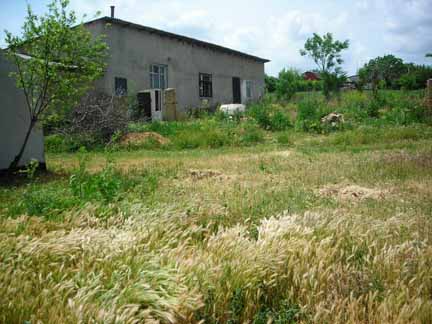
Another look of the Mannheim area.
|
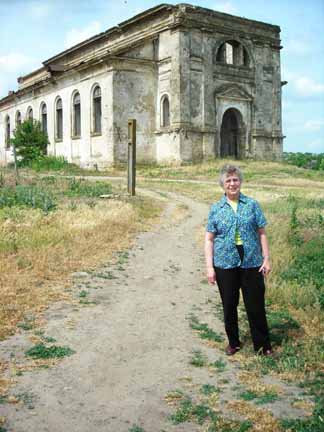
Sister Anita Whalen is shown in
front
of the former Mannheim cathedral. |
Strassburg
Strassburg (now Kuchurhan) is located at the border between Ukraine
and Moldova, on the East side. We found it was in a great position for
our lunch stops on both of our two days visiting the villages of
Kutschurgan. The restaurant we used, next to the outdoor market, is
very likely located on property once the homesite of an ancestor of
Lorraine Kraft, one of our group.

We felt that finding this restaurant alongside the highway was a good bit of luck.
|
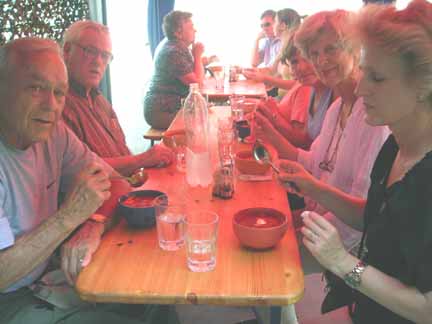
The borscht and other food served us was
so good we decided it deserved a second visit the next day.
|

This large church at
Strassburg, as well as those built in the other villages, showed the
importance their faith was to the German colonists.
|
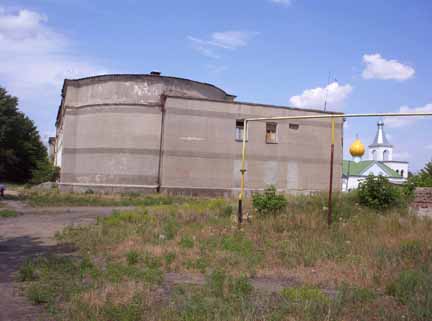
The Strassburg
church had been converted to civic purposes by the Russians, as were those
in the other Kutschurgan villages.
|

A large graveyard was
located behind the church. This was an example of the graves found there.
|
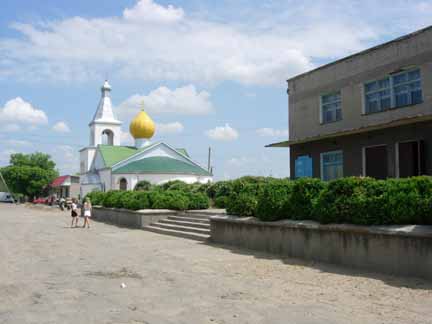
Since religious practices
are again permitted in this area, new churches have been built in recent
years. This one is adjacent to the old Catholic church. |
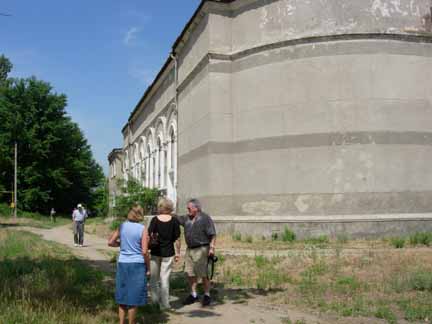
Ed Merck points out the
location of the area which was the graveyard of the former German colonists, now neglected and abandoned.
|

This roadside
"convenience store" served us well as a refreshment stop.
|
Selz
The village of Selz, now named Lymans'ka, is South of Strassburg along the
Kutschurgan Liman (lake). Our interest in visiting this village was
primarily to visit the museum. Following years of exile, Luisa Reisling was
allowed to return to her family home in Selz. She established the museum to
tell the story of the early German colonists who had established these
villages. As we had in the other villages, we started our visit at the church
building.
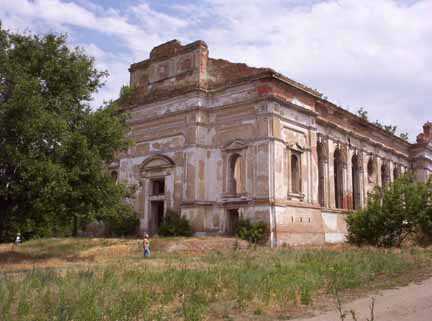
The Selz Cathedral was an impressive
building.
|

This is a side view of the Selz Cathedral.
|

Dan and Anna
Whalen are pictured inside the building.
|

Another view of the
inside of the Cathedral with Ed Merck at the end.
|

This photo shows
Mike Merck inside the Cathedral.
|

We were not the only ones
inside the church building. |

A sign marks the entrance to the
building housing the museum.
|

The museum is
located adjacent to the church building.
|
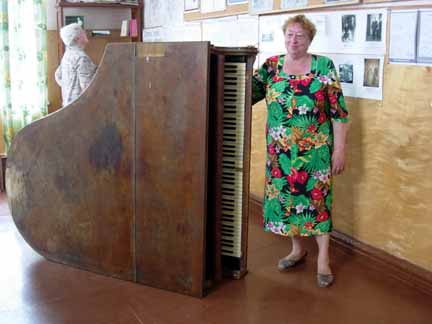
Luisa Reisling showed us an
historic
piano donated to the museum.
|
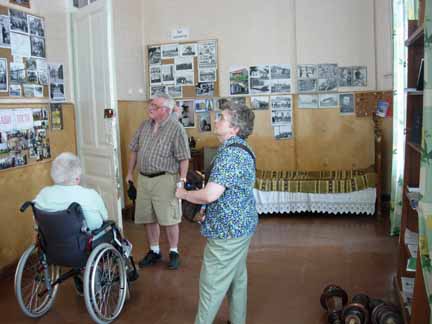
Cathi, Ed and Anita
examine pictures and documents on museum walls.
|
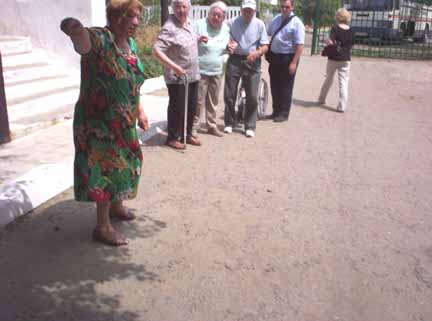
As we left the museum, Luisa
invited us to visit her home.
|

We all enjoyed the
short walk to the Reisling home.
|
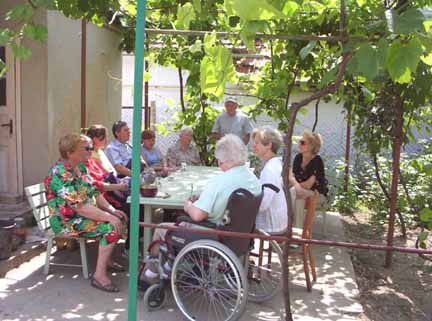
Following a tour of
the
house and cellar, Luisa
served us refreshingly cool cherry juice on her
terrace.
|
Alsace
Click here for photos taken in Alsace.
Photos were taken by Marilyn Bruya, Lorraine Kraft, Ed Merck and Anita Whalen.
 Back to home page. Back to home page.
|










































 Back to home page.
Back to home page.